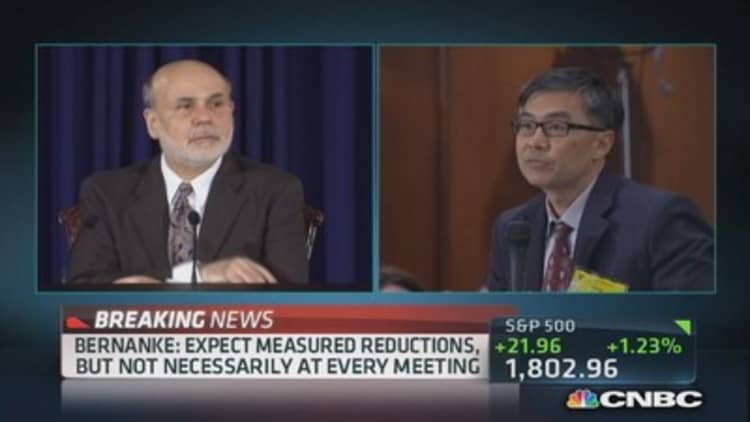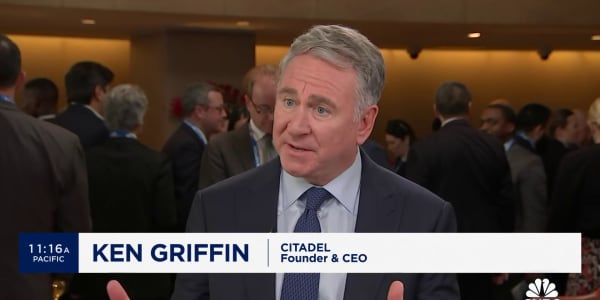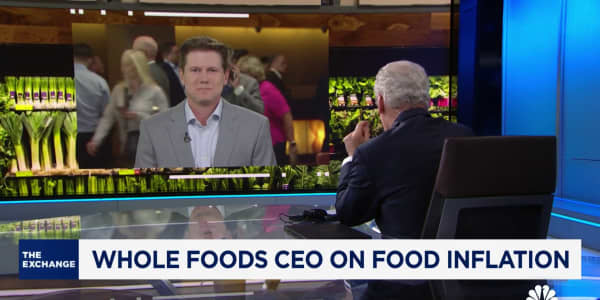The looming end of emergency jobless benefits would be bad news for 1.3 million Americans but actually could have a positive impact on the unemployment rate.
At a time when the monthly jobless count has taken on even more importance than usual, the move in Washington toward ending the emergency compensation immediately would drop the unemployment rate below 7 percent, according to an analysis from Joe LaVorgna, chief U.S. economist at Deutsche Bank.
"If extended benefits expire, the unemployment rate could abruptly fall based on data the (Bureau of Labor Statistics) provides on the behavior of the long-term unemployed," LaVorgna said in a report for clients.
The analysis runs counter to recent comments from Fed Chairman Ben Bernanke, who said he didn't expect much impact from the end of extended compensation.

(Read more: On tap for next year: Legit economic growth?)
The headline rate has fallen from its recession high of 10 percent due in part to job creation in 2013 that has grown to just short of 200,000 per month, but more particularly because of a shrinking labor force.
Labor force participation has hovered around a 35-year low for most of the year. Because the BLS only counts those actively seeking jobs as unemployed, the rate has been able to slip.
The unemployment rate is especially significant because the Federal Reserve uses it to chart its monetary policy path. Most recently, a drop to 7 percent in November helped convince the U.S. central bank that it could scale back its monthly bond-buying program known as quantitative easing.
(Read more: Fed to taper bond buying by $10 billion a month)
However, the Fed has said that it will not consider raising interest rates until unemployment falls to at least 6.5 percent.
With that number getting nearer, another drop could be seen as a step closer to interest rate normalization. The Fed began tapering QE ahead of what the market had expected as well.
According to LaVorgna's analysis, BLS data have shown that of the 1.3 million who would lose their extended benefits, 23 percent likely would leave the labor force, causing the unemployment rate to drop two-tenths of a percentage point.
In addition, another 850,000 who are on extended state unemployment benefits would be impacted in the first quarter of 2014. Using the same formula would see the rate drop another 0.1 percentage point to 6.7 percent, LaVorgna said.
(Slideshow: These 5 people have the coolest jobs ever)
"This does not even account for the ongoing improvement in the labor market," he added. "Large job gains akin to what we have witnessed recently would push the unemployment rate even lower."
Finally, there's the unsettled question over whether cutting benefits pushes people back to work. A drop in government support may help push some into taking jobs they may have refused otherwise.
Whether that would push the Fed into early action on rates is unclear. Open Markets Committee members are fully aware that the labor force participation rate decline—not stellar job growth—has been integral to the declining unemployment rate.
In fact, if the rate did drop that quickly, it probably would result in the Fed following through with its economists' suggestions and lower the unemployment rate threshold to 6 percent or even 5.5 percent before action on interest rates.
Congressional Republicans have refused to extend benefits without having a means to pay for it, likely through a corresponding spending cut. The extension allows jobless Americans to collect in some cases up to 99 weeks and has been approved 10 times.
But with economic data improving and Congress looking for ways to cut costs, the extension was left out of the spending deal agreed to earlier in December.
—By CNBC's Jeff Cox. Follow him on Twitter @JeffCoxCNBCcom.






